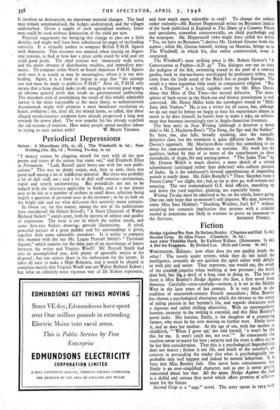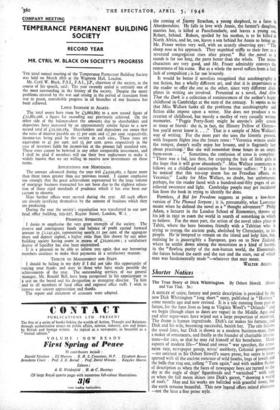Fiction
WORTHINESS, aullness : how often does the one quality imply the other! The novels under review, while they do not insult the intelligence, certainly do not quicken the, spirit either with delight or with pity and terror. They represent, one would say, the result
of the creati*Timpulse when working at low the kettle does boil, but devil of a long time in doing so. he best of them is Miss Bentley's Hedge Against the Sun, a first novel from America. Carefully—over-carefully—written, it is set in the Middle West in the later years of last century. It is very much in the tradition of nineteenth-century French naturalism ; Miss Bentley has chosen a psychological aberration which she elevates to the status of ruling passion in her heroine's life, and regards characters with a rigorous and rather chilling objectivity. With an unsympathetic heroine, intensity in the writing is essential, and this Miss Bentleys novel lacks. Her heroine, Emily, is the daughter of a pioneering farmer, who must be for ever moving on further west. Emily hates it, and so does her mother. At the age of ten, with her mother in childbirth, " When I grow up,' she told herself, it won't be like this for me. It won't catch me, not ever.' " So consciously she resolves never to marry foilove ; security and the roots it offers are to be her first consideration. That this is a psychological improbability does not matter ; fiction is not life, and much of the novelist's art consists in persuading the reader that what is psychologically im- probable may well happen and indeed be normal behaviour. It is here that Miss Bentley fails. One never loses consciousness that Emily is an over-simplified character, and so one is never great' concerned -about her fate. All the same, Hedge Against the Sun is a skilful and serious first novel which offers promise of achieve- ment for the future.
Second Crop is a " saga " novel. The story opens in 1914 with
the coming of Jimmy Strachan, a young shepherd, to a farm in Aberdeenshire. He falls in love with Annie, the- farmer's daughter, marries her, is killed at Passchendaele, and leaves a young son, Robert, behind. Robert, spoiled by his mother, is to be killed in North Africa, and he, too, leaves a son behind for Annie to bring up, Mr. Fraser writes very well, with an acutely observing eye : " The sheep rose at his approach. They stumbled stiffly to their feet as a reverend congregation rises after prayer." But the „novel as it stands is far too long, the parts better than the whole. The minor characters are very good, and Mr. Fraser admirably conveys the remoteness of his scene. But as a whole the novel suffers from a fatal
lack of compulsion ; is far too leisurely. •.
It would be better if novelists recognised that autobiography is not fiction, but a wholly different art, and that it is impertinent to the reader to Offer the one as the other, since very -different disci- plines in writing are involved. Presented as a novel, And After - That the Dark is a collection of reminiscences of the author's happy childhood in Cambridge at the turn of the century. It segms to me that Miss Wallace funks all the problems that autobiography and fiction alike impose upon a writer. She does not produce a re- creation of childhood, but merely a medley of very casually written memories. " Peggie PerryScott might be anyone's jolly cousin or niece or friend : she is, in fact, the History Fellow of Girton— but you'd never know it. . That is a sample of Miss Wallace's way of writing.- For the most part she Uses the- historic present, with frequent flights into the future tense : " Veronica winces under the temper, doesn't. really enjoy her lessons, and is flagrantly lazy about practising. But she will remember those hours in an empt form-room . . ." Sometimes the confusion of tense is complete: "There was a fad, just then, for cropping the hair of little girls in the hope that it will grow abundantly."—.Miss Wallace comments as follows on a childhood catastrophe her heroine suffers : " It is to be noticed that this tea-cup storm has no Freudian effects on Veronica." Lucky for Miss Wallace, no doubt, but unfortunate, perhaps, for the reader faced with a hundred-and-fifty pages of un- relieved sweetness and light. Cambridge people may get- incidental fun from the book in trying to identify the dons.
Formless, A Bid for Freedom suggests at points a .low-brot; version of The Plumed Serpent ; it is, presumably, what Lawrence meant when he defined the novel as a " thought adventure." Philip Adam, a lecturer in the London School of Economics throws up his job in 1931 to roam the world in search of something in which to believe. For the most part, the action of the novel takes place in Tahiti, where the hero becomes friendly with a Tahitian who is trying to restow, the ancient gods, abolished by Christianity, to his people. He 'is tempted to remain on the island and help- him, but, realising he is ,incorrigibly a European, goes on to New Zealand, where he settles down among the mountains as a kind of hermit, in the "flawless purity of the non-human world, the Elementals, the forces behind the earth and the sun and the stars, out of which man was fundamentally made "—whatever that may mean.
WALTER ALLEN.































 Previous page
Previous page